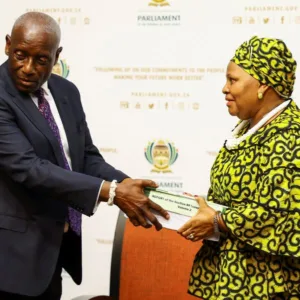Ramaphosa is on the brink of impeachment
Mr. Ramaphosa, who is accused of hiding millions of dollars in cash, faces the biggest threat of his time in power.
On Wednesday, Cyril Ramaphosa nearly became the first South African president to be impeached after a report found evidence that he broke the law for a stash of cash stolen from one of his properties.
The conclusion of an independent parliamentary body essentially amounts to a recommendation that Mr. Ramaphosa should face a parliamentary hearing that could lead to his impeachment if two-thirds of lawmakers vote against him.
The panel cast doubt on the president’s explanation for how the large sum of U.S. currency came to be hidden in — and stolen from — a couch in his living quarters. “The information presented by the president on the storage of the money is vague and leaves unsettling gaps,” the report said.
Must read: Ramaphosa may have seriously violated law on Phala Phala
While his ultimate fate has yet to be decided, Ramaphosa now faces the deepest crisis of his presidency, with his future as South Africa’s leader in serious doubt.
The National Assembly will meet next week to discuss the report and decide whether to hold a removal hearing. Analysts say it seems likely lawmakers will choose to proceed.
Mr. Ramaphosa faces other challenges as well.
In about two weeks, his party, the African National Congress (ANC), will convene its national conference, and he is expected to face a fierce battle for a second term as leader. His detractors within the deeply divided party have pressed for his removal since allegations surfaced in June that he stashed millions of dollars on his ranch and launched a clandestine investigation after the money was stolen.
With an impeachment hearing perhaps imminent, those foes are likely to smell blood in the water. “His opponents inside the ANC will be going for his head,” said Bongani Ngqulunga, who teaches politics at the University of Johannesburg.

In a statement released late Wednesday, Mr. Ramaphosa reiterated his stance that he had done nothing to violate his constitutional oath and spoke of “an unprecedented and extraordinary moment for South Africa’s constitutional democracy.”
“The conclusions of the panel require careful reading and appropriate consideration in the interest of the stability of the government and that of the country,” he said.
Now that advantage could be in doubt. The national executive committee of the ANC is scheduled to meet on Thursday to discuss the panel’s findings. The president is almost certain to face a chorus of opposition. Under ANC rules, officials facing criminal charges are suspended from their roles. Although the finding does not amount to criminal charges, Mr. Ramaphosa’s detractors are likely to argue that he has been morally compromised.
“There’s only one message to him: He must go,” said Tony Yengeni, an executive committee member and longtime Ramaphosa opponent. “He must step aside, and he must cooperate with the police and face the music.”
The panel found that Mr. Ramaphosa’s version of events contradicted that of his security chief. And his account was marred by holes, he said, with no clear explanation of who the Sudanese businessman was, why there was no written record of the sale, and whether he ever picked up the buffalo he bought.
Mr. Ramaphosa abused his power as head of state to try to get help in his investigation from the president of Namibia, where some of the robbery suspects have fled, the report said.
The panel ruled that the evidence suggested that Ramaphosa failed to report or pay foreign exchange taxes to South Africa’s central bank.
Must read: Phala Phala independent investigating panel will get to work on Wednesday
“There are weighty considerations which leave us in substantial doubt as to whether the stolen foreign currency is the proceeds of the sale,” the report said.
Ultimately, the panel concluded, there was evidence that the president may have violated the Constitution in conducting private business that conflicted with his official duties, and he may have violated anti-corruption laws by failing to report the theft to competent authorities.
Mr. Ramaphosa also faces two other investigations – one from the prosecutor’s office and another from the public protector, a watchdog to corruption – which could add to his woes.
The impeachment panel was created at the request of an opposition party. In August, the President of the National Assembly, himself a member of the ANC initiated the procedure described in the Parliament’s Rules of Procedure. The speaker, Nosiviwe Noluthando Mapisa-Nqakula, appointed a panel of two retired judges and a lawyer to determine whether there was any evidence to support an impeachment case. The panel’s findings essentially boil down to the conclusion that Mr. Ramaphosa should be accountable for his conduct and establish that he has not broken the law, said Tembeka Ngcukaitobi, a South African lawyer specializing in constitutional cases. But, he stressed, the findings don’t mean the president has broken the law.
Must read: Ramaphosa will be asked to answer to Phala Phala scandal
